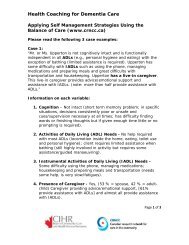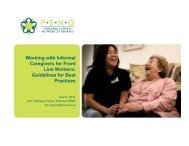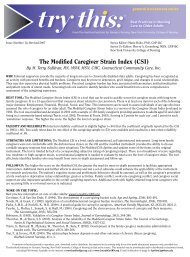Elicit - solutions - east toronto's health collaborative
Elicit - solutions - east toronto's health collaborative
Elicit - solutions - east toronto's health collaborative
You also want an ePaper? Increase the reach of your titles
YUMPU automatically turns print PDFs into web optimized ePapers that Google loves.
Healthy Connections 2010<br />
Self-Managing Care: From Ideas to Solutions<br />
February 17, 2010<br />
Putting Motivational<br />
Interviewing Skills<br />
into Practice<br />
Marilyn Herie, PhD, RSW<br />
Rosa Dragonetti, MSc
You can’t change the<br />
wind, but you can<br />
adjust the sails…
• What are your major<br />
motivational challenges<br />
with patients?<br />
• What would you like to learn<br />
or improve upon?
Learning Objectives<br />
Use reflective listening in a strategic and<br />
motivational way<br />
Apply resistance strategies in response to<br />
challenging client statements or questions<br />
Use a structured change plan with clients<br />
around tobacco reduction and cessation<br />
Set professional development goals with<br />
respect to the application of motivational<br />
techniques in tobacco cessation interventions
Roadmap<br />
- What is motivational interviewing?<br />
- Dealing with ambivalence<br />
- Providing Information in a motivational<br />
way<br />
- Reflective listening and OARS<br />
- Developing a change plan<br />
- Setting practice objectives
Persuasion Exercise<br />
Choose one person near you to have a<br />
conversation with, and work together<br />
Not with your boss or supervisor<br />
One will be the speaker, the other will be<br />
a counselor<br />
7
Speaker’s Topic<br />
Something about yourself that you<br />
want to change<br />
need to change<br />
should change<br />
have been thinking about changing<br />
but you haven’t changed yet<br />
…in other words – something you’re<br />
ambivalent about<br />
8
Counsellor: Find out what change the<br />
person is considering making, and then:<br />
Explain why the person should make this<br />
change<br />
Give at l<strong>east</strong> three specific benefits that<br />
would result from making the change<br />
Tell the person how they could make the change<br />
Emphasize how important it is to change<br />
If you meet resistance, repeat the above.<br />
P.S. This is NOT motivational interviewing<br />
9
Listeners:<br />
What were you thinking<br />
or feeling during this<br />
conversation?
Common Reactions to Righting Reflex<br />
Angry, agitated<br />
Oppositional<br />
Discounting<br />
Defensive<br />
Justifying<br />
Not understood<br />
Not heard<br />
Procrastinate<br />
Afraid<br />
Helpless, overwhelmed<br />
Ashamed<br />
Trapped<br />
Disengaged<br />
Not come back – avoid<br />
Uncomfortable<br />
11
What is Motivational Interviewing?<br />
Motivational Interviewing is a <strong>collaborative</strong>,<br />
person-centred form of guiding to elicit and<br />
strengthen motivation for change.<br />
Bill Miller, MINT Listserv, Sep 2009<br />
Techniques involve listening reflectively,<br />
eliciting change talk, examining<br />
ambivalence, rolling with resistance, and<br />
not pushing for change prematurely.
A taste of Motivational Interviewing 13
A Taste of Motivational Interviewing:<br />
Conversation with one speaker and one listener.<br />
Speaker’s Topic:<br />
Something about yourself that you<br />
want to change<br />
need to change<br />
should change<br />
have been thinking about changing<br />
but you haven’t changed yet<br />
i.e. – something you’re ambivalent about<br />
14
Listener<br />
Listen carefully with a goal of understanding the dilemma<br />
Give no advice.<br />
Ask these four open questions and listen with interest:<br />
1. Why would you want to make this change?<br />
2. How might you go about it, in order to succeed?<br />
3. What are the three best reasons to do it?<br />
4. On a scale from 0 to 10, how important would you<br />
say it is for you to make this change?<br />
Follow-up: And why are you at __ and not zero?<br />
Give a short summary/reflection of the speaker’s<br />
motivations for change<br />
Then ask: “So what do you think you’ll do?” and<br />
just listen<br />
15
Listeners:<br />
What were you thinking<br />
or feeling during this<br />
conversation?
Common Human Reactions to<br />
Being Listened to<br />
Understood<br />
Want to talk more<br />
Liking the counselor<br />
Open<br />
Accepted<br />
Respected<br />
Engaged<br />
Able to change<br />
Safe<br />
Empowered<br />
Hopeful<br />
Comfortable<br />
Interested<br />
Want to come back<br />
Cooperative<br />
Would you rather work with these people . . . . 17
…or these?<br />
Angry, agitated<br />
Oppositional<br />
Discounting<br />
Defensive<br />
Justifying<br />
Not understood<br />
Not heard<br />
Procrastinate<br />
Afraid<br />
Helpless, overwhelmed<br />
Ashamed<br />
Trapped<br />
Disengaged<br />
Not come back – avoid<br />
Uncomfortable<br />
18
“He that complies against his will<br />
is of the same opinion still.”<br />
Samuel Butler<br />
1612-1680<br />
English Poet
What is Motivational Interviewing?<br />
Motivational Interviewing is a <strong>collaborative</strong>,<br />
person-centred form of guiding to elicit and<br />
strengthen motivation for change.<br />
Bill Miller, MINT Listserv, Sep 2009<br />
Techniques involve listening reflectively,<br />
eliciting change talk, examining<br />
ambivalence, rolling with resistance, and<br />
not pushing for change prematurely.
MI Publications by Year<br />
Number of Publications<br />
1000<br />
900<br />
800<br />
700<br />
600<br />
500<br />
400<br />
300<br />
200<br />
100<br />
0<br />
83<br />
85<br />
87<br />
89<br />
91<br />
93<br />
95<br />
97<br />
99<br />
1<br />
3<br />
5<br />
New Studies Years<br />
Cumulative<br />
Source: www.motivationalinterview.org/library/biblio.html<br />
21
350<br />
300<br />
250<br />
200<br />
150<br />
100<br />
50<br />
0<br />
MI Publication Trajectory<br />
163<br />
6 6 10<br />
34<br />
85<br />
245<br />
267<br />
303<br />
2005-07<br />
2008-10<br />
1987-89<br />
1990-92<br />
1993-95<br />
1996-98<br />
1999-2001<br />
2002-04<br />
Year<br />
1983-86<br />
# Publications
100<br />
80<br />
60<br />
40<br />
20<br />
0<br />
MI Outcome Studies by Era<br />
1988-94 1995-99 2000-02 2003-06<br />
Alcohol Drugs Dual Dx Gambling<br />
Offenders Eating Dis Adh/Retention Smoking<br />
HIV Risk Cardiac Diabetes Psychiatric<br />
Health Prom Family Violence Asthma<br />
Dental<br />
23
2002 2009
2007 2008
MI Drawn<br />
From:<br />
Motivational<br />
psychology<br />
Rogerian therapy<br />
Stages of Change<br />
(Transtheoretical)<br />
model<br />
www.motivationalinterview.org
5 Principles of<br />
Motivational Interviewing<br />
1. Avoid arguing<br />
2. Express empathy<br />
3. Develop discrepancy<br />
4. Roll with resistance<br />
5. Support self-efficacy
Phase 1:<br />
Building<br />
Motivation<br />
FOUR KEY STRATEGIES – OARS<br />
OPEN questions (to elicit client change talk)<br />
AFFIRM the client appropriately (support,<br />
emphasize personal control)<br />
REFLECT (try for complex reflections)<br />
SUMMARIZE ambivalence, offer doublesided<br />
reflection
Video<br />
Demonstration<br />
“Reflective<br />
Listening”
Practicing Reflective Listening (1)<br />
“How I live my life is no<br />
one else’s business, and<br />
certainly not yours!”
Practicing Reflective Listening (2)<br />
“I know I need to be more<br />
active, I just never seem to<br />
find the time.”
Saunders’ Law of<br />
Behavior Change<br />
People only change when the<br />
pain of change is less than the<br />
pain of staying the same.
“A Psychological<br />
Law”<br />
I learn what I believe as I hear<br />
myself speak.<br />
- Bill Miller
Providing Information…<br />
in a motivational way…
Directing<br />
VERSUS
Guiding
<strong>Elicit</strong>/Provide/<strong>Elicit</strong><br />
Sequence<br />
<strong>Elicit</strong> the patient’s<br />
understanding of the problem<br />
Provide information<br />
<strong>Elicit</strong> patient’s response to<br />
your information
<strong>Elicit</strong>/Provide/<strong>Elicit</strong><br />
Consultation with a patient<br />
(recent stroke) who has<br />
been told by her doctor to<br />
make multiple lifestyle<br />
changes.
<strong>Elicit</strong><br />
What is your<br />
understanding of<br />
your doctor’s<br />
recommendations?
Oh, she is<br />
saying I<br />
have to<br />
totally<br />
change the<br />
way I live!<br />
Quit<br />
smoking,<br />
lose weight,<br />
eat<br />
<strong>health</strong>ier…<br />
<strong>Elicit</strong>
<strong>Elicit</strong><br />
Reflective response<br />
It seems pretty<br />
unreasonable,<br />
not to mention<br />
overwhelming
Well, I guess<br />
I will have to<br />
make some<br />
changes,<br />
but this is<br />
ridiculous<br />
<strong>Elicit</strong>
<strong>Elicit</strong><br />
Reflective response<br />
You want to stay<br />
<strong>health</strong>y, but it’s<br />
hard to imagine<br />
where to start and<br />
what would be<br />
reasonable for you
Yes! I’ve been<br />
through a lot,<br />
and I’m also<br />
worried about<br />
my job, and<br />
the kids, and<br />
how this is<br />
affecting my<br />
relationship<br />
<strong>Elicit</strong>
Provide<br />
It’s a lot to deal<br />
with, yet<br />
smoking and<br />
weight are<br />
important risk<br />
factors for<br />
having another<br />
stroke
<strong>Elicit</strong><br />
What’s your<br />
understanding<br />
of the risks if<br />
you decide not<br />
to make any<br />
changes in<br />
these areas?
<strong>Elicit</strong><br />
Well, the doctor<br />
said that no<br />
matter what I<br />
do, the odds of<br />
having another<br />
stroke are high.<br />
So what’s the<br />
point?
<strong>Elicit</strong><br />
Reflective response<br />
You’re<br />
wondering if<br />
going to all of<br />
the effort to<br />
make these<br />
changes will<br />
even be worth it<br />
in the end
Exactly. I<br />
might as<br />
well at l<strong>east</strong><br />
enjoy life!<br />
Provide
Provide It’s true that<br />
having had one<br />
stroke means that<br />
your risk is higher,<br />
but each added<br />
risk factor<br />
increases the<br />
odds even more
Envisioning<br />
<strong>Elicit</strong><br />
Of all of the<br />
suggestions<br />
your doctor<br />
made, what<br />
seems to you to<br />
be the most<br />
reasonable to<br />
address?
I don’t know, I<br />
haven’t gotten<br />
that far. I guess<br />
losing weight –<br />
that’s<br />
something I’ve<br />
wanted to do<br />
for a long time<br />
<strong>Elicit</strong>
<strong>Elicit</strong><br />
Reflective response<br />
It’s not easy<br />
dealing with all of<br />
this pressure to<br />
change. But it<br />
sounds like at<br />
l<strong>east</strong> one of the<br />
suggestions might<br />
be in line with<br />
your own goals
<strong>Elicit</strong><br />
Asking Permission<br />
Would you be<br />
willing to look<br />
at some<br />
options<br />
together and let<br />
me know what<br />
you think?
QUESTIONS<br />
OR<br />
COMMENTS?
Giving Information and Advice:<br />
3 Kinds of Permission<br />
1. The person asks for advice<br />
2. You ask permission to give advice<br />
3. You qualify your advice to emphasize<br />
autonomy<br />
68
Giving Information and Advice<br />
Get permission<br />
Qualify, honoring autonomy<br />
Ask – Provide – Ask<br />
(<strong>Elicit</strong>/Provide/<strong>Elicit</strong>)<br />
For suggestions, offer several instead<br />
of one<br />
69
Readiness Ruler<br />
Circle the number (from 0 to 10) on each of the rulers that best fits with how<br />
you are feeling right now.<br />
1. How important is it to change your behaviour?<br />
0 1 2 3 4 5 6 7 8 9 10<br />
2. How confident are you in your ability to change?<br />
0 1 2 3 4 5 6 7 8 9 10<br />
3. How ready are you to make this change?<br />
0 1 2 3 4 5 6 7 8 9 10
Follow-up Questions<br />
“Why are you at (current score) and not<br />
zero?”<br />
“What would it take for you to get from<br />
(current score) to (higher score)?”<br />
“What has made this change this important to<br />
you so far, as opposed to it being<br />
unimportant (zero)?”<br />
“What would it take to make this change<br />
even more important to you?”
Practice: <strong>Elicit</strong>/Provide/<strong>Elicit</strong><br />
Partner A:<br />
You have been referred by your doctor to the<br />
<strong>health</strong>/counselling services because you have not<br />
been following the special diet that has been<br />
prescribed for your <strong>health</strong> condition. Your family is<br />
not very supportive, and you are reluctant to make<br />
changes.<br />
Partner B:<br />
Practice the elicit/provide/elicit framework<br />
Remember: be brief in the “provide” (giving<br />
information) part of your interaction!
What was<br />
this exercise<br />
like?<br />
Comments?
Developing a Change Plan
Change is not<br />
something you<br />
do to people, but<br />
with people.
Comments<br />
and<br />
Questions?
“You can lead a horse to water, but<br />
you can’t make him drink.”<br />
…But you CAN make him<br />
thirsty!
Wrapping-up
Generalizing Gains<br />
“Changes in practice behaviour are small<br />
and ephemeral after a training event,<br />
unless specific steps are taken to<br />
continue the change process.” (MINT,<br />
2004)
“Readiness Ruler”<br />
How important is it to start using some of<br />
these strategies/tools?<br />
0 1 2 3 4 5 6 7 8 9 10<br />
How confident are you that you could apply<br />
them in your practice?<br />
0 1 2 3 4 5 6 7 8 9 10<br />
How ready are you to actually use them?<br />
0 1 2 3 4 5 6 7 8 9 10
Practice Goals<br />
What is one thing you will commit to practicing with<br />
your patients in the coming week?<br />
_____________________________________________<br />
_____________________________________________<br />
_____________________________________________
Thank you!<br />
Marilyn Herie, PhD, RSW<br />
(416) 535-8501 x 7434<br />
marilyn_herie@camh.net<br />
Rosa Dragonetti, MSc<br />
(416) 535-8501 x 7404<br />
rosa_dragonetti@camh.net<br />
www.teachproject.ca<br />
www.can-adaptt.net







